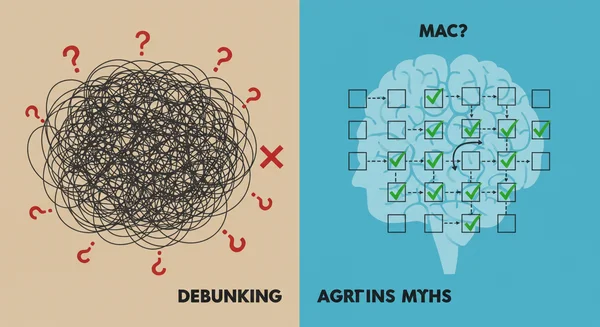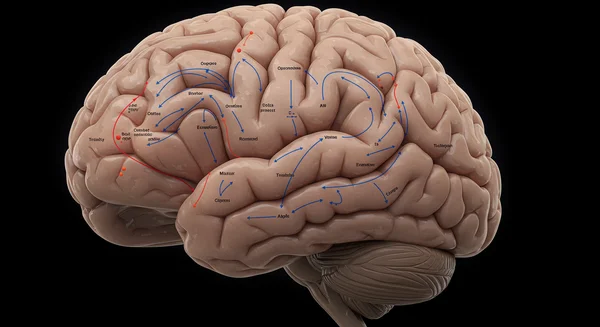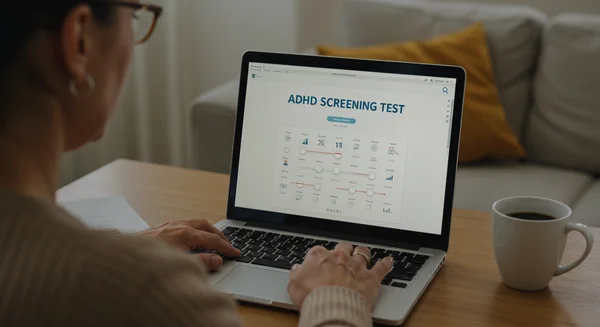Bài kiểm tra ADHD: Phá bỏ những lầm tưởng & quan niệm sai lầm phổ biến
Trong một thế giới tràn ngập thông tin, thật khó để phân biệt sự thật và hư cấu, đặc biệt là khi nói đến Rối loạn Tăng động Giảm chú ý (ADHD). Thông tin sai lệch có thể tạo ra sự bối rối, kỳ thị và rào cản cho những người tìm kiếm sự rõ ràng. Nếu bạn đã từng tự hỏi, "Liệu tôi có bị ADHD không?", bạn không đơn độc. Hướng dẫn này ở đây để phá bỏ những lầm tưởng phổ biến xung quanh tình trạng này, trao quyền cho bạn một cái nhìn dựa trên bằng chứng để giúp bạn trên hành trình khám phá bản thân. Bước đầu tiên để hiểu là có được thông tin chính xác, và một bài kiểm tra ADHD đáng tin cậy có thể là một công cụ mạnh mẽ trong quá trình đó.
Những quan niệm sai lầm ngăn cản nhiều người khám phá những đặc điểm tiềm ẩn của họ. Bằng cách giải quyết trực tiếp những lầm tưởng này, chúng ta có thể thúc đẩy một sự hiểu biết chính xác và nhân ái hơn về ADHD. Cho dù bạn là người lớn đang vật lộn với sự tập trung, một phụ huynh lo lắng về con mình, hay một sinh viên đang tìm kiếm kiến thức, việc làm rõ những sai lầm này là rất quan trọng. Sẵn sàng khám phá sự thật? Một nơi tuyệt vời để bắt đầu là với một bài kiểm tra sàng lọc trực tuyến bảo mật.

Giải mã những lầm tưởng phổ biến về ADHD: Đâu là sự thật và đâu là hư cấu?
Hãy cùng phá bỏ một số lầm tưởng phổ biến và có hại nhất về ADHD. Hiểu rõ thực tế đằng sau những định kiến này là điều cần thiết cho bất kỳ ai đang cân nhắc tự đánh giá ADHD hoặc tìm kiếm sự hỗ trợ cho bản thân hoặc người thân. Sự rõ ràng này giúp mở đường cho các phương pháp tiếp cận hiệu quả và nhân ái hơn để quản lý các đặc điểm của nó.
"ADHD không có thật": Khám phá khoa học đằng sau tình trạng này
Một trong những lầm tưởng tai hại nhất là ADHD không phải là một tình trạng y tế thực sự mà chỉ là một cái cớ cho hành vi kém hoặc thiếu ý chí. Điều này là không chính xác về mặt khoa học. Các tổ chức y tế, tâm thần và giáo dục lớn, bao gồm Hiệp hội Tâm thần Hoa Kỳ và Tổ chức Y tế Thế giới, công nhận ADHD là một rối loạn phát triển thần kinh hợp pháp. Nghiên cứu cho thấy ADHD có liên quan đến sự khác biệt trong cấu trúc não, chức năng não và sự truyền dẫn của các chất dẫn truyền thần kinh quan trọng, đặc biệt là dopamine và norepinephrine. Những khác biệt thần kinh này không phải là một lựa chọn; chúng là một khía cạnh cơ bản trong cấu trúc não của một cá nhân, ảnh hưởng đến khả năng điều hòa sự chú ý, xung động và mức độ hoạt động của họ.

"Chỉ là thiếu kỷ luật": Hiểu về những thách thức của chức năng điều hành
Nhiều người nhầm lẫn các triệu chứng ADHD với những khiếm khuyết về tính cách, cho rằng đó là do lười biếng hoặc thiếu kỷ luật. Trên thực tế, những thách thức liên quan đến ADHD xuất phát từ sự suy yếu trong các chức năng điều hành não bộ. Đây là những kỹ năng nhận thức cấp cao mà chúng ta sử dụng để lập kế hoạch, tổ chức, bắt đầu nhiệm vụ, quản lý thời gian và kiểm soát xung động. Khi các chức năng điều hành bị suy yếu, những nhiệm vụ đơn giản như thanh toán hóa đơn đúng hạn, hoàn thành đúng thời hạn hoặc giữ phòng gọn gàng có thể trở nên to lớn. Đó không phải là vấn đề không muốn làm; mà là hệ thống quản lý của não bộ gặp khó khăn trong việc thực hiện các bước cần thiết. Một bài kiểm tra ADHD trực tuyến có thể cung cấp những hiểu biết ban đầu về việc liệu những thách thức này có phù hợp với các đặc điểm của ADHD hay không.
"Nó chỉ ảnh hưởng đến những cậu bé hiếu động": Thực tế về ADHD ở người lớn & phụ nữ
Hình ảnh cổ điển về ADHD là một cậu bé không thể ngồi yên trong lớp. Mặc dù định kiến này mô tả một biểu hiện của ADHD, nhưng nó lại không đầy đủ một cách nguy hiểm. ADHD ảnh hưởng đến mọi người ở mọi lứa tuổi, giới tính và xuất thân. Ở trẻ em gái và phụ nữ, nó thường biểu hiện khác biệt, thường ít hiếu động hơn và có nhiều triệu chứng không chú ý hơn như mơ màng, mất tổ chức và bồn chồn bên trong. Bởi vì những triệu chứng này ít gây rối hơn, chúng thường bị bỏ qua, dẫn đến chẩn đoán bị bỏ lỡ hoặc chậm trễ. Tương tự, nhiều người lớn sống với ADHD chưa được chẩn đoán, đã vật lộn trong nhiều năm với những thách thức mà họ cho là do lỗi cá nhân. Một bài kiểm tra ADHD cho người lớn là một công cụ quan trọng cho những người nghi ngờ những khó khăn kéo dài cả đời của họ có thể có một cái tên.

Vượt ra ngoài những định kiến: Các triệu chứng & biểu hiện thật sự của ADHD
Để thực sự hiểu về ADHD, chúng ta phải nhìn xa hơn những định kiến và nhận ra các triệu chứng đa dạng và phức tạp của nó. Tình trạng này phức tạp hơn nhiều so với sự hiếu động đơn thuần hoặc việc không thể tập trung. Một bài kiểm tra triệu chứng ADHD chính xác sẽ xem xét một loạt các hành vi và trải nghiệm nội tâm ảnh hưởng đến cuộc sống hàng ngày.
Nhận biết ADHD dạng không chú ý: Hơn cả sự hiếu động
Mặc dù sự hiếu động là một triệu chứng nổi tiếng, nhưng các khía cạnh không chú ý của ADHD cũng quan trọng không kém và thường tinh tế hơn. ADHD chủ yếu dạng không chú ý có thể biểu hiện là khó duy trì sự chú ý vào các nhiệm vụ, mắc lỗi bất cẩn, dễ bị phân tâm bởi các kích thích bên ngoài và gặp khó khăn trong việc tổ chức. Các cá nhân có thể có vẻ hay quên trong các hoạt động hàng ngày, thường xuyên làm mất đồ và tránh các nhiệm vụ đòi hỏi nỗ lực tinh thần bền vững. Biểu hiện này là lý do tại sao nhiều người, đặc biệt là phụ nữ và người lớn, không nhận ra họ có thể bị ADHD — họ không "nhảy nhót khắp nơi", nhưng thế giới nội tâm của họ thường là một cơn lốc của những suy nghĩ và sự phân tâm cạnh tranh.
Tác động rộng hơn: Điều hòa cảm xúc & Thách thức trong cuộc sống hàng ngày
Tác động của ADHD không chỉ giới hạn ở mức độ chú ý và hoạt động. Nhiều cá nhân bị ADHD cũng gặp phải những thách thức đáng kể trong việc điều hòa cảm xúc. Điều này có thể dẫn đến những cảm xúc mãnh liệt, dễ bực tức, thay đổi tâm trạng và nhạy cảm cao với những lời chỉ trích, đôi khi được gọi là Rối loạn nhạy cảm với sự từ chối (RSD). Những khó khăn về cảm xúc này có thể làm căng thẳng các mối quan hệ, ảnh hưởng đến hiệu suất công việc và góp phần làm giảm lòng tự trọng. Hiểu rằng những thành phần cảm xúc này là một phần của bức tranh rộng lớn hơn về ADHD là rất quan trọng để tự phản ánh chính xác và tìm kiếm loại hỗ trợ phù hợp. Một bài kiểm tra sàng lọc ADHD toàn diện sẽ xem xét những thách thức liên quan này.
Tại sao việc phá bỏ định kiến về ADHD lại quan trọng đối với việc sàng lọc chính xác
Kỳ thị và thông tin sai lệch là những rào cản lớn nhất để nhận được sự giúp đỡ. Khi xã hội bác bỏ ADHD là giả hoặc tầm thường hóa các triệu chứng của nó, các cá nhân cảm thấy xấu hổ khi khám phá những khó khăn của mình. Việc phá bỏ những lầm tưởng này không chỉ là một bài tập học thuật; đó là một hành động trao quyền khuyến khích mọi người tìm kiếm câu trả lời mà họ xứng đáng có được.
Trao quyền cho sự tự phản ánh có thông tin & Các bước tiếp theo
Khi bạn có sự thật, bạn có thể nhìn vào cuộc sống của mình với sự rõ ràng hơn và ít tự trách mình hơn. Bạn có thể bắt đầu nhìn thấy các kiểu mẫu không phải là thất bại cá nhân mà là các triệu chứng tiềm ẩn của một tình trạng phát triển thần kinh. Sự thay đổi trong quan điểm này là vô cùng mạnh mẽ. Nó cho phép bạn chuyển từ câu hỏi "Tôi bị làm sao vậy?" sang "Não của tôi hoạt động như thế nào, và tôi có thể làm gì để hỗ trợ nó?" Một bước đầu tiên có thông tin, như làm một bài kiểm tra ADHD miễn phí, có thể là cánh cửa dẫn đến sự hiểu biết và lòng tự trắc ẩn mới này.
Bước đầu tiên của bạn: Vai trò của một bài kiểm tra sàng lọc ADHD trực tuyến đáng tin cậy
Mặc dù việc chẩn đoán chính thức phải đến từ một chuyên gia y tế có trình độ, nhưng một công cụ sàng lọc trực tuyến đáng tin cậy là một bước đầu tiên vô giá. Nó cung cấp một cách riêng tư, dễ tiếp cận và ít áp lực để khám phá các đặc điểm của bạn dựa trên các câu hỏi được thông tin khoa học. Mục tiêu của một công cụ như bài kiểm tra sàng lọc ADHD trực tuyến của chúng tôi không phải là để cung cấp chẩn đoán mà là để đưa ra một báo cáo cá nhân hóa, được hỗ trợ bởi AI, giúp bạn hiểu các kiểu mẫu về sự chú ý, hiếu động và bốc đồng của mình. Báo cáo này có thể đóng vai trò là điểm khởi đầu cụ thể cho cuộc trò chuyện với bác sĩ, giúp bước tiếp theo bớt đáng sợ hơn.

Tiến về phía trước với sự rõ ràng: Hành trình của bạn để hiểu về ADHD
Phá bỏ những lầm tưởng về ADHD là thay thế sự kỳ thị bằng khoa học và sự bối rối bằng sự rõ ràng. Hiểu rằng ADHD là một tình trạng phát triển thần kinh thực sự với nhiều biểu hiện đa dạng là bước đầu tiên để tự chấp nhận và quản lý hiệu quả. Những trải nghiệm của bạn là có giá trị, và việc khám phá chúng là một dấu hiệu của sức mạnh.
Nếu hướng dẫn này đã gây được tiếng vang với bạn, hành trình của bạn không nhất thiết phải kết thúc ở đây. Hãy thực hiện bước tiếp theo đầy sức mạnh. Truy cập trang chủ của chúng tôi để làm một bài kiểm tra ADHD miễn phí, bảo mật và toàn diện ngay hôm nay. Hãy để báo cáo được hỗ trợ bởi AI của chúng tôi cung cấp cho bạn những hiểu biết cá nhân hóa mà bạn cần để tự tin tiến về phía trước.
Các câu hỏi thường gặp về ADHD & Sàng lọc
Bạn có thể làm bài kiểm tra ADHD trực tuyến không, và nó có chính xác không?
Có, bạn có thể làm một bài kiểm tra sàng lọc ADHD trực tuyến. Điều quan trọng là phải hiểu sự khác biệt giữa sàng lọc và chẩn đoán. Một công cụ trực tuyến đáng tin cậy, như bài kiểm tra sàng lọc ADHD trực tuyến của chúng tôi, được thiết kế như một công cụ sàng lọc ban đầu dựa trên các tiêu chí được công nhận. Nó có thể chỉ ra chính xác sự hiện diện và mức độ nghiêm trọng của các đặc điểm ADHD tiềm ẩn, nhưng nó không thay thế cho việc chẩn đoán lâm sàng chính thức từ một chuyên gia y tế. Hãy coi nó như một bước đầu tiên sâu sắc và cung cấp thông tin.
Các triệu chứng chính của ADHD cần chú ý là gì?
Các triệu chứng chính thuộc hai loại chính: không chú ý và hiếu động/bốc đồng. Không chú ý bao gồm khó duy trì sự tập trung, mất tổ chức, hay quên và mắc lỗi bất cẩn. Hiếu động/bốc đồng bao gồm bồn chồn, cựa quậy, nói quá nhiều, ngắt lời người khác và hành động mà không suy nghĩ. Một người có thể có các triệu chứng chủ yếu là không chú ý, các triệu chứng chủ yếu là hiếu động-bốc đồng, hoặc kết hợp cả hai.
Tôi nên làm gì sau khi làm bài kiểm tra sàng lọc ADHD trực tuyến?
Sau khi hoàn thành bài kiểm tra sàng lọc ADHD trực tuyến, bạn sẽ nhận được một báo cáo chi tiết, cá nhân hóa. Bước tiếp theo tốt nhất là xem xét báo cáo này và cân nhắc chia sẻ nó với bác sĩ hoặc chuyên gia sức khỏe tâm thần. Báo cáo có thể cung cấp một bản tóm tắt có cấu trúc, có giá trị về những trải nghiệm của bạn, giúp tạo điều kiện cho một cuộc trò chuyện hiệu quả về việc đánh giá chính thức, chẩn đoán và các chiến lược hỗ trợ có thể có.